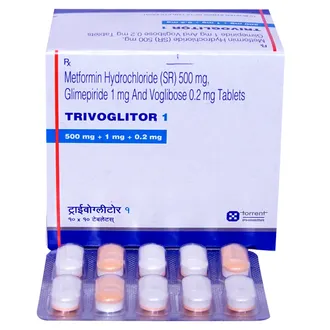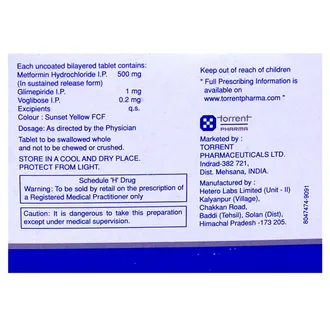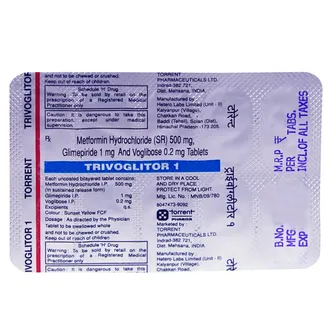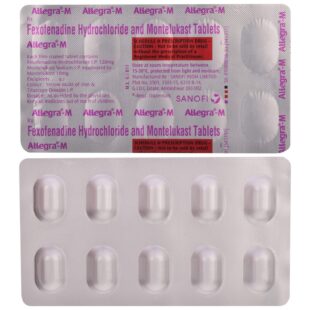- Your cart is empty
- Continue Shopping
Product Introduction
Trivoglitor 1 mg Tablet is a combination medicine used to manage type 2 diabetes mellitus in adults. It helps control blood-sugar levels when diet, exercise, and single-drug therapy are insufficient. The medicine works by improving the body’s utilization of insulin, reducing glucose production in the liver, and increasing cellular sensitivity to insulin—thereby lowering blood-glucose levels and preventing complications of diabetes such as kidney damage, nerve problems, and vision issues.
Uses of Trivoglitor Tablet
Treatment of Type 2 Diabetes Mellitus
Improvement of glycemic control in adults inadequately controlled on monotherapy
Reduction of diabetes-related long-term complications
Benefits of Trivoglitor Tablet
Lowers and stabilizes blood-sugar levels effectively
Improves the body’s response to natural insulin
Helps reduce excess glucose produced by the liver
Minimizes risk of diabetic complications (kidney, eye, nerve, and vascular damage)
Supports better energy levels and metabolic health when combined with proper diet and exercise
How to Use
Take Trivoglitor 1 mg Tablet in the dose and duration prescribed by your doctor.
Swallow it whole with water—do not crush, chew, or break the tablet.
Take it with food to avoid stomach upset.
Try to take it at the same time each day for consistent blood-sugar control.
Do not skip meals while using this medicine to prevent low blood-sugar episodes.
How Trivoglitor Tablet Works
Trivoglitor 1 mg Tablet is a triple-combination antidiabetic medicine containing Glimepiride, Metformin, and Pioglitazone.
Glimepiride (a sulfonylurea) increases insulin secretion from the pancreas.
Metformin (a biguanide) decreases glucose production in the liver and improves insulin sensitivity.
Pioglitazone (a thiazolidinedione) further enhances the body’s response to insulin.
Together, they effectively reduce blood-sugar levels and maintain long-term glycemic control.
Side Effects of Trivoglitor Tablet
Most side effects are mild and temporary. Contact your doctor if they persist.
Common side effects include:
Hypoglycemia (low blood-sugar level)
Headache or dizziness
Nausea, vomiting, or diarrhea
Abdominal discomfort
Weight gain or mild swelling
Joint or muscle pain
Upper-respiratory-tract infection
Seek medical attention immediately if you experience severe hypoglycemia, breathing difficulty, or signs of liver or heart issues.
Safety Advice
Alcohol: Unsafe. Alcohol intake may increase the risk of low blood sugar.
Pregnancy: Consult your doctor. Limited human data; animal studies show potential risk.
Breast-feeding: Not recommended—medicine may pass into breast milk.
Driving: Caution. Low-blood-sugar symptoms (dizziness, blurred vision) can impair driving ability.
Kidney / Liver Disease: Use with caution; dose adjustment may be needed. Not recommended in severe impairment.
General Advice
Monitor your blood-glucose levels regularly.
Follow a balanced diabetic diet and exercise plan.
Avoid skipping doses or stopping the medicine abruptly.
Periodic checks of kidney, liver, and heart function are advisable during prolonged use.















Reviews
There are no reviews yet.